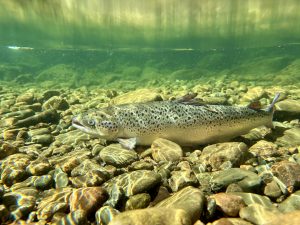He also does a disservice to the proud men and women who already work in the region’s salmon-farming sector. They are proud because they know they are working in a responsible, innovative and home-grown business that is keeping families together by providing well-educated young people with highly skilled jobs and a reason to stay home to raise their families.
Mr. Cameron is correct when he says there is controversy over salmon farming. Most of it is due to misinformation that is spread by articles such as the one written by Mr. Cameron. We invite him to tour a farm to get a first-hand experience of how salmon are farmed in Nova Scotia. There are issues, but let’s consider them in light of the facts, not fiction.
The entire salmon-farming sector in Atlantic Canada is owned and managed by Atlantic Canadians. Our people are investing in the region and putting our own people to work. Consumers can go to their local grocery stores and buy fresh, nutritious salmon that is farmed in Atlantic Canada’s pristine coastal waters by their neighbours and friends within Canada’s tough regulatory regime.
Consumers and business owners alike want to be sure salmon farms are an efficient and sustainable way to produce food. Thanks to investments in research and the work of feed specialists in Nova Scotia, it now takes much less than one kilogram of wild fish (not four) to grow one kilogram of farmed salmon. Compare that to beef, pork and chicken, which are far less efficient both in feed and water usage.
Our local feed companies use far fewer fish ingredients than were used in the past and in other areas of the world. This has been possible partially through the increased use of plant proteins and grains, many of which are locally sourced; and because, where possible, we use byproducts from our local fishery for fishmeal. This recycles seafood waste and reduces our reliance on wild fish even further.
We do not use growth hormones. We rely on preventive measures and best practices to make sure our fish stay healthy but, like all farmers, we need to be able to treat our animals when they are attacked by parasites or disease. This is done only under the direct supervision of veterinarians and only with treatments that have been approved by Health Canada.
Waste from excess feed and feces is strictly controlled by underwater cameras, better feeds and farm staff who are trained by fish behaviourists so that fish are fed only when they are hungry. A government-run environmental monitoring program requires routine sampling of the ocean floor and underwater videos to measure impact. We also use low stocking densities and fallow or rest our farms between crops.
Rather than listen to messages of doom from well-funded anti-salmon farming activists in Norway, B.C. or Scotland, Nova Scotians should talk to the farmers, scientists and community leaders who have direct knowledge and experience with the sector. This includes experts in our own world-class academic and research institutions: Dalhousie University, Atlantic Veterinary College, Nova Scotia Agriculture College, Memorial University’s Marine Institute, Huntsman Ocean Sciences and the University of New Brunswick.
Our members welcome public scrutiny. That is why our companies are submitting their farms to audits for certification to internationally accredited quality and eco-labels, why they are opening storefront offices in communities where they do business and why they are answering questions and sharing information about their investment and job-creation plans. Websites that will provide information can be found at www.aquaculturegrowsns.com, www.allaboutsalmon.ca or www.atlanticfishfarmers.com.
Half of the seafood that is eaten in the world today comes from a farm. That number will increase as the world’s population and demand for healthy seafood grow. Let’s have a respectful dialogue about the future. We need to decide whether we want our children and grandchildren to eat fish that is farmed in other parts of the world or right here at home in their natural environment.
